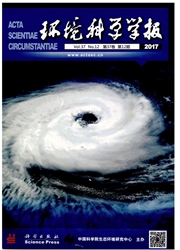

 中文摘要:
中文摘要:
利用北京环境空气质量定点监测资料,研究了北京市城近郊区近20年来环境空气质量的变化趋势及其影响因素.结果表明,从年际变化看,SO2、降尘、B[a]P浓度显著下降,而NOx、CO浓度和O3超标情况显著上升,空气污染处于由煤烟型向机动车尾气型转变的过程中,表现出典型的复合污染特征.年内变化显示,采暖期污染比非采暖期严重。尤其SO2在采暖期浓度是非采暖期的5.7倍.从空间分布上看,TSP、降尘、O3表现为近郊区污染重于城区;SO2、NOx、CO表现为城区污染重于近郊区.空气污染源增加的压力与环境保护措施的相互作用是驱动北京市近20年环境空气质量变化的主要因素.产业结构的变化、重点污染源的整治、能源结构调整、能源的清洁使用、机动车尾气排放标准的提高等对保护环境空气质量起到一定作用.
 英文摘要:
英文摘要:
Change of the ambient air quality in the urban and suburb areas of Beijing since 1980's was analyzed. The data was referred from the long-term monitoring stations which were three stations in the urban area and four at the suburb of Beijing. The result showed that, different pollutants had different trends. SO2 had fluctuant increase before 1998 and then declined. As a whole, it showed a downward tendency in these 20 years. However, NOx, CO and ozone pollution also increased first then fell, taken 1998 as a watershed. But they had the significant upward tendencies in these two decades. During this period, dusffall and B[ a] P continuously declined significantly. TSP, PM10 and Pb had no significant trends but reduce a little. The reason of air pollution had changed from coal burning pattern to mixed pattern including both traffic exhaust and coal burning. Seasonally, pollution level was heavier in heating season from November to next March, than that in non-heating season from April to October. For example, SO2 concentration in heating season was 5.7 times high than that in non-heating season. As to the pollution spatial distribution, TSP, dustfall and ozone pollution were heavier in the suburb, while SO2, NOx and CO concentrations were higher in the urban area. The increasing sources caused more pollution these years, while many environmental protection policies implemented to reduce. This interaction was the main driving factor that caused the above change. Improve the energy efficiency, reduce pollution sources, use clean energy and implement advanced environmental standards had contributed to reduce the pollution, especially since 1998.
 同期刊论文项目
同期刊论文项目
 同项目期刊论文
同项目期刊论文
 期刊信息
期刊信息
